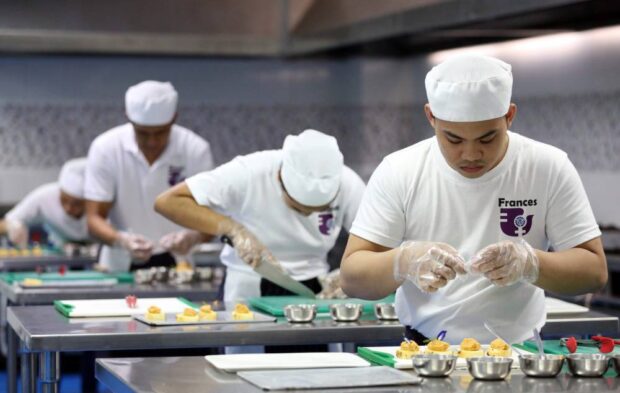
TRAINING In this 2018 photo, students train under the Technical Education and Skills Development Authority’s Cookery National Certificate Level II Course to hone their knowledge and skills in preparing cold meals such as canapes and an open sandwich served as an appetizer. —LYN RILLON
President Ferdinand Marcos Jr. on Tuesday directed the country’s educational agencies to fix the current school programs to match the country’s current job demands with the skills given to senior high school (SHS) graduates.
In his sectoral meeting in Malacañang, the President directed the Technical Education and Skills Development Authority (Tesda) to “upskill and reskill” the graduates to meet the jobs required by the country’s industries, amid recent data that only 20 percent of SHS graduates were able to land jobs.
“We need the involvement of the industry as they tell us what kind of workers they need and what kind of training [our schools] need to give. This, in turn, will lead us to put additional learning tracks,” he said.
The President met with officials of the education sector led by Education Secretary Sara Duterte and Tesda Administrator Suharto Mangudadatu to discuss proposals to improve the country’s technical-vocational education and training (TVET) program.
READ: Senator: Tesda ‘misaligned’ programs
He lamented that the government has been offering livelihood programs and skills training such as dressmaking and cosmetology, which were no longer adapted to the present times.
“We truly need this assessment of the labor market and the involvement of the industry. We need to have a close linkage with the industry so that even if our graduates are not hired outright, jobs are available and are waiting for them,” he said.
He likewise said that Tesda’s training programs should be better designed for students in lower-class towns.
“So, we really have to study that more, we can no longer rely on that shotgun effect—no one cares who gets hit,” the President noted.
Recalibrated training program
Tesda responded that it was proposing to embed its training programs in the various tracks of the SHS program that would allow graduates to obtain a national certification normally required of applicants in blue-collar jobs.
Following consultations with the Department of Education (DepEd), the Department of Labor and Employment (Dole) and private stakeholders, Tesda said it had identified 84 training regulations that could be inserted into the existing SHS curriculum.
The President then directed Tesda, DepEd, Dole and the Commission on Higher Education to form a technical working group to study Tesda’s project.
At a briefing, Tesda Deputy Director General Rosanna Urdaneta cited a study by the Philippine Institute for Development Studies showing that only 20 percent of SHS graduates landed jobs.
“That is what we want to improve because that 20 percent who get employed even involve menial jobs, such as cleaning or clerical tasks. If one has the skills, employers will value their competency and not assign them to roles like preparing coffee or running errands,” she said.
“Aside from a high school diploma, they will also get a national certificate, which will come in handy once they encounter financial difficulties in pursuing college education and [are] compelled to work,” she said.
She also dismissed fears that Tesda’s proposal to embed its training in the SHS program would entail an added financial burden on parents.
“This will [also] not lead to a disruption of [students’] time for studies; the real burden would be on the teacher-trainers because their skills need to be improved,” she said.
According to Urdaneta, Tesda estimated that it would have to train 4,000 DepEd teachers for a period of 15 days for its “recalibrated” TVET program. INQ